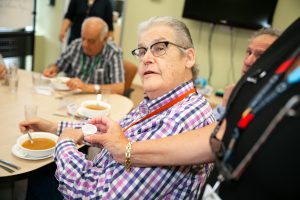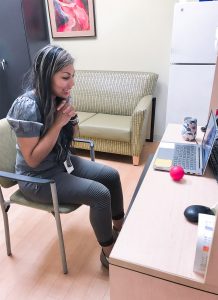
Murray enjoys a meal with friends at our Adult Day Program. (Photo taken before the pandemic).
Joan has been caring for her husband ever since they got married 55 years ago. But the term ‘caring’ took on a new meaning when her husband, Murray, was diagnosed with Alzheimer’s disease in 2014.
“There were many challenges I had to overcome after he was first diagnosed,” says Joan. “But, I always try to remind myself that ‘it’s the disease, not the patient.’ As in, it’s not who the person was before the disease.”
With Alzheimer’s, a person’s memory and cognitive abilities are greatly affected as the disease progresses. They often repeat themselves, forgetting many daily routines, tasks, and stories.
“Sometimes I feel like pulling my hair out after he asks me the same question for what feels like the 400th time in the last 30 minutes,” says Joan. “I know it’s not him, and it’s the disease, but knowing something and experiencing it are two different things. Having patience can be difficult at times.”
As Murray’s primary caregiver, Joan continuously educates herself on his disease. To keep herself connected with others in her situation, she attends Caregiver Support Groups. She also has made sure that her husband can stay mentally stimulated and physically active by enrolling him in Circle of Care’s Adult Day Program. Murray started attending our ADP program in 2017, and it quickly became a highlight of his day.
At the ADP, Murray is surrounded by trained professionals and is within a safe environment that supports his cognitive, social, physical, emotional, and spiritual needs. Murray and his fellow program members enjoy participating in a variety of activities, including arts and crafts, dancing, card games, and musical performances. All activities are thoughtfully considered to ensure maximum participation from clients, and to add fun and enjoyment to our clients’ days.
These activities had to be put on pause in early 2020 after the pandemic forced the Adult Day Program to close temporarily for everyone’s safety. The absence of the ADP was felt strongly by clients and their caregivers.
“I’m not going to lie, it was horrible during those early days of the pandemic. Since I’m his wife, Murray feels less inclined to do what I say,” says Joan. “I asked my PSW what to do since he wasn’t going to the in-person program anymore. She said ‘continue on.’ And that was the case. I had to continue on.”

ADP recreationist Jennifer connects with our ADP clients and their families over ZOOM during daily activities.
While Circle of Care’s ADP team was brainstorming new ways to help both clients and caregivers bridge the gap of isolation, Joan became responsible for Murray’s care in a much more intensive way. Outside of Murray’s PSW care, Joan and Murray became mostly isolated, as did all of the other ADP clients and caregivers. The fear of infection and illness added a heightened level of anxiety for everyone. Everyone wanted ADP activities again, but they knew it needed to be done safely.
In response to the continued restrictions, Circle of Care launched a virtual edition of the ADP program in June 2020. This virtual programming allowed Murray to connect online with his friends from ADP and get back into a more structured daily routine.
Eventually, Circle of Care was able to reopen the doors of our ADP and invite clients back to for in-person activities. While program capacity is still quite limited, we are currently pleased to provide programming for 12 clients each day.
“The Adult Day Program and the other resources are such a godsend! Everybody needs an ADP. It’s so hard to function without having one,” says Joan. “I’m so grateful for my PSWs and the Adult Day Program because they help remind me that it’s not the person, but the disease.”
________________________________________
Circle of Care’s Adult Day Program provides evidence-based programming to clients with dementia and Alzheimer’s who live in the community, and gives their caregivers the ability to rest, run errands, and recharge. The Adult Day Program runs at a secure site to meet the needs of clients who present with exit-seeking behaviours. Each day is filled with activities and socialization aimed specifically at those who have been diagnosed with dementia. Staff members are specially trained to handle responsive behaviours, through re-direction and de-escalation.


